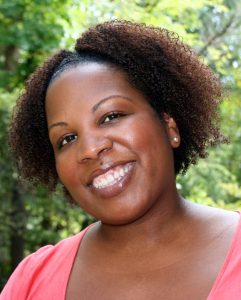Interview by Katie Turner, Employee Forum public relations and communications committee chair
 I recently had the pleasure of serving on a hiring committee with Clarissa Goodlett, program and communications manager at the Sonja Haynes Stone Center for Black Culture and History. Through the hiring committee, I got to know Clarissa and found out that we have a lot of the same interests–everything from social justice movements to reality television shows and pop culture. Clarissa was kind enough to let me interview her for InTouch so you all can have the opportunity to get to know her and the work of the Stone Center, too.
I recently had the pleasure of serving on a hiring committee with Clarissa Goodlett, program and communications manager at the Sonja Haynes Stone Center for Black Culture and History. Through the hiring committee, I got to know Clarissa and found out that we have a lot of the same interests–everything from social justice movements to reality television shows and pop culture. Clarissa was kind enough to let me interview her for InTouch so you all can have the opportunity to get to know her and the work of the Stone Center, too.
Hi, Clarissa. Thanks for agreeing to be interviewed for InTouch. You and I have known each other for only a short time, but I feel like I already know a lot about you. For those staff who don’t know you, can you talk a little bit about what you do at the Stone Center?
As the Program and Communications Manager at the Stone Center, I’m responsible for the planning and execution of more than 40 programs and events the Stone Center produces yearly. In addition to managing our program logistics, I also serve as the lead on Stone Center public relations and communications activities including promoting Stone Center events and activities, media relations and constituent relations.
What did you do before your time at UNC, and what surprised you most when you started working here?
Prior to joining the Stone Center team, I worked in variety of organizing and communications positions in government and politics–including U.S. presidential and senate campaigns and the North Carolina Governor’s Office. I’m an activist at heart, and I’ve held roles in community outreach and political advocacy at several non-profit organizations, such as ColorofChange.org—the nation’s leading online racial justice organization. Before stepping into politics, I worked as an engineer for an information technology consulting firm. My undergraduate degree is in industrial engineering.
I’m surprised the most by how much I love working with UNC students and what an integral role they play in the work that I do. I’m not in a teaching position, but I frequently find myself in a mentoring and teaching role and its one of my favorite parts of the job. Our students are really what makes UNC special, and I’m fortunate enough to be reminded of that every day.
What is the best part about working at UNC, and what would you change if you could?
Because of UNC’s world-class reputation, we are able to bring to campus and have access to acclaimed artists, authors, performers and scholars– many of whom have been brought to campus by the Stone Center. It’s been pleasure and privilege to interact with and engage these thought leaders.
February has been a busy month for you since you’ve been doing a lot programming for Black History Month. Can you talk a little about some of the programs the Stone Center has planned?
As part of our mission to educate the campus and surrounding community about the arts and culture of the African diaspora, we are committed to producing program and events that meet that mission year-round. Of course, February is no exception. We are fortunate because during February, communities tend to be more focused and interested in taking advantage of opportunities to engage these types of programs. We continue to produce our signature programs during the month including our Writer’s Discussion series and the Diaspora Festival of Black and Independent Film Festival Screenings. We recently featured Candis Watts Smith and her book, Black Mosaic: The Politics of Black Pan-Ethnic Diversity. Our complete program agenda is always available via our website and Facebook.
The Stone Center has played a major role in educating the UNC community about black culture. It has also recently had to defend its existence to the Board of Governors back in December. Have you felt an outpouring of support of the Center from the campus or have things been quiet? What can staff do to show their appreciation and support for the Center?
We certainly felt support from all corners of campus and community—students, faculty, staff and other Stone Center supporters in the community. I believe staff can support us by attending our events and programs. A visible show of support for the events that happen at the Stone Center is a clear reminder that the Center and its activities are providing a unique value and service to our campus and the larger Chapel Hill community. When you come, bring your friends with you!
That’s a wonderful idea, Clarissa. Thanks for taking the time out to be interviewed. I look forward to seeing you at Stone Center events!
